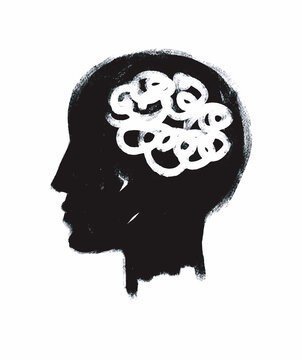How to Get Out Of Your Own Way to Start Better Managing Your Anxiety
There are days when my anxiety is so high that I don’t even feel like trying to manage it. It feels like too much. I’d rather stay stuck experiencing unpleasant, anxious feelings than spend a ton of energy trying to reduce it. Or, I’m so caught up in my anxious thoughts that I can’t even recognize how anxious I am. Or, when I really dig deep, I wonder who the heck would I be if I wasn’t anxious?
Can you relate?
I’ve been thinking a lot about these moments and why I don’t take action to better manage my anxiety. And since I’m having a pretty high anxiety day today, what better time than the present to call B.S. on myself! If you want to figure this out for yourself as well, then today’s blog is for you. Today I’m diving into the reasons why we sometimes don’t pursue feeling better to help encourage you to get out of your own way and take the actions you need to reduce your anxiety and feel more peace and ease throughout your day.
Getting Stuck
Everyone feels stuck in their life at some point. Sometimes it’s other people that get in the way, and sometimes we do it to ourselves. And, if you struggle with anxiety, you probably tend to be very good at getting in your own way because you assume the worst and overthink most scenarios. You can’t help it! Your brain gets fixated on the issue because it’s trying to control what it believes to be a dangerous situation to keep you alive and safe. And even when you know you are overthinking, it feels almost impossible to stop the voices in your head! These ruminating thoughts create a perceived danger and your “thinking brain” (or prefrontal cortex) goes offline so your “emotional brain” (or amygdala) can take over and keep you alive! You literally stop using your executive functions and start habitually responding from a place of concern and worry. Every possible scenario runs through your head as your brain tries to control the outcome, which perpetuates your anxiety even more and creates more overthinking.
Your brain is literally playing tricks on itself. And the only way to stop it is to step in as the witness and break the cycle.
But it takes a lot of energy and strength to stop overthinking. Think of it like swimming upstream. The natural tendency is to believe the voices in your head - like swimming with the current, it comes easy! Any time you go against the current you have to work hard to relearn your natural tendencies.
Some days it’s very easy to swim upstream and not actively listen to your anxiety. Other days, when your energy is low and you are stressed or depleted, it becomes much harder to find the momentum and strength you need to swim upstream. Even if the river’s current is fast or slow, the voices eventually win, the current takes over and you find yourself caught in a downward anxious spiral.
You’re left feeling stuck, overwhelmed and extremely anxious.
Why We Stay Stuck
When this happens to me, I feel like an impostor. How can I possibly teach you how to better manage your anxiety when I’m unable to feel less anxious on my own?
Come to find out, there are a lot of reasons why you might be getting in your own way, in addition to the games that your brain plays on you, when you are anxious. And sometimes knowing why we are stuck can be the gateway for getting unstuck. Here are a few reasons why you might be choosing to stay anxious.
Overwhelm and Burnout. Also known as feeling depleted. Your body and mind only have so much energy to give out each day. And when you use all that energy up, you can be left feeling fatigued, you might make poor decisions (or no decisions at all) and you might have a hard time controlling your emotions. There is no more energy to support the executive function of the brain so it’s almost impossible to stop thinking from your “primitive brain” to turn on your “thinking brain” and step in as the witness.
The Inner Critic or Judge. Enter unconscious self-limiting and self-sabotaging beliefs. This inner voice is your negativity bias - and it is ruthless. The inner critic is the quality of consciousness that’s constantly scanning for danger. It learns how to be on the lookout for what could go wrong through life experiences (like touching a hot stove) or from your culture and your parents. These experiences are taken in through the senses and a story starts to develop. When the critic notices an unpleasant experience, it believes you are unsafe and must keep that from happening to you again. Therefore, it scans for danger, 100% unconsciously, using the stories or “filters” it created and it feels like this is the way things really work - this is what life is.
“If I am successful, people won’t love me anymore.”
“If I mess up, people will realize that there’s something wrong with me.”
“I guess I don’t really matter because no one is paying attention to me.”
“I have to be different to get attention or love.”
If you are unaware of these stories and filters, you won’t be able to get out of your own way in order to start combating your anxiety. Can anyone say “impostor syndrome?”
Lack of Purpose. If you don’t know what you are “fighting for” then it’s going to be hard to muster up the energy to fight. Why should you stop feeling anxious when there’s no real point? If you don’t have a reason for wanting to feel less anxious, then it will be difficult to work toward better managing it.
Resistance to Change. Most people don’t like change. We want things to stay the same or things to be something they aren’t because uncertainty is a threat to our survival and our inner-critic is telling us to stay stuck because it’s safe. Your brain is literally convincing itself that anxiety is OK because it’s what you know.
Getting Unstuck
The very first step to getting unstuck is having self awareness. Notice when you are feeling anxious. Think of it like snapping a rubber band on your wrist. You need that “ah-ha” moment to create just a little bit of space between anxiety and your reaction to it so that you can turn on your executive function of the brain and start to think things through. Each of us will feel anxiety differently, so learn to recognize the symptoms you experience in an anxious moment. You might notice:
Scattered thoughts, unable to concentrate
Irritability or tension in the muscles of your body
Sweating or heart racing
Trembling in the limbs - like you need to shake off the excess energy in the body (this is what happens to me)
Shortness of breath
General Restlessness
Once you recognize that you are caught in an anxious moment, you might say out loud, “I’m feeling anxious right now.” That statement alone can wake you up to the present moment and snap the thinking brain back into action.
At this point, if you choose to stay stuck and let your anxiety control you, that’s OK. Some days I actually choose to be anxious because that’s what I believe I need - to simply feel all my feelings. However, there are other times I can tell I’m staying stuck in my anxiety because I’m overwhelmed, afraid of change or my inner critic is telling me otherwise.
The second step is to take action. There’s no other way to say it. Once you know you are feeling anxious, and you are choosing to stay anxious because you are stuck, the only way to move forward is to take action. And sometimes taking that action is like a slap in the face or a kick in the butt.
You don’t want to - with every ounce of your being - but you know you HAVE TO in order to feel better.
The action you take depends on why you are feeling stuck.
Feeling Overwhelmed. Figure out how to refill your well with an activity that you enjoy. You could move, breathe, meditate, sleep, get in nature, write in a journal, do a puzzle or listen to your favorite music. The important step is to choose the activity and start it. Once you do, your mind will start to switch from anxious and get absorbed with your self-care activity.
Self-limiting beliefs. Start a regular meditation practice. Not only does meditation help you stay in the present moment and reduce your anxiety, it also helps you start to understand the nature of your mind and your patterns of resistance (i.e., your inner critic). Once you can see these patterns and understand your triggers, you’ll recognize the stories that are holding you back and simply note them as stories - not the truth. This will help you move away from being stuck and toward finding freedom from your anxiety.
No Purpose. Spend some time journaling what is important to you. Why do you want to feel better to be better? What is your “why”? Just thinking through why you want to better manage your anxiety - maybe for the people in your life or for your own goals and dreams - can give you the energy you need to take action when you are feeling overwhelmed.
Resistant to change. Remember that everything born out of causes and conditions will change - everything is impermanent. Whatever we hold on to is going to result in rope burn. Whatever we let go of is going to result in some sort of ease. Sometimes just naming what is holding you back can be the freedom you need to begin managing your anxiety.
So there you have it. Sometimes it’s a hard pill to swallow, but it’s the medicine we need to get out of our own way and start living the life we deserve. My hope is that you feel empowered to better understand why you might be stuck and how to take action toward finding freedom and relief from your anxious mind. And, in addition to the above, if you want to learn additional steps you can do right now to feel less worry and more ease in your life, Download my Essential Guide to Coping with Uncertainty today!



